The last month has been filled with the dramatic impact of demonitisation. This possibly inspired move was intended to curtail black money which is prevalent throughout every transation in India: from the unregistered maid to the more impactful millions of dollars in bribes that tend to move for major real estate transactions to the millions of ₹50 ($1) bribes paid to the poor during election season. India cannot progress until this black market is controlled – simple. Hence the inspired moved to overnight ban the two large denomination notes (₹500 ($10) and ₹1000 ($20)) which form the basis for most black market transactions.

A Bridegroom 6 days after the introduction of the new₹2000 note. Restricted to withdrawals of ₹4,500 a week. His suit is made of these notes. This was at a wedding cost hundreds of millions of dollars – all clean according to both families – really!?
Reality is that the implementation was so poorly thought through that a month later the impact on the poor is heart-breaking and the reality is that the wealthy just rapidly moved their money into gold / diamonds and have quickly managed to come by the new notes (₹500 ($10) and ₹2000 ($40)) through bribes, threats and connections. It is the poor with money but no means of accessing it that are going hungry. Impact of Demonitisation It is the migrant daily workers with no means of being paid who are being forced to give up their lives in the cities and go home to the small farms they originally left in desperation. Video: Monkey Has Just Been Paid
 It has been easy therefore this month to focus purely on the negative. Focus on the fact that you have to watch every rupee: that you have to consider whether you really need to take a rickshaw or whether it is better to walk. I could also focus on the all pervasive pollution that rolls in thickly every evening and somewhat recedes during the day: leaving your eyes gritty, your chest clogged and with a, at times, hacking cough. These are the things that it is so very easy to focus on. For me however the last month has also brought significant progress in a very more positive way.
It has been easy therefore this month to focus purely on the negative. Focus on the fact that you have to watch every rupee: that you have to consider whether you really need to take a rickshaw or whether it is better to walk. I could also focus on the all pervasive pollution that rolls in thickly every evening and somewhat recedes during the day: leaving your eyes gritty, your chest clogged and with a, at times, hacking cough. These are the things that it is so very easy to focus on. For me however the last month has also brought significant progress in a very more positive way.
For me, my greatest achievement since moving to India has been my involvement with Ashta No Kai, a small but impactful charity operating in 9 villages around Pune.
I have been teaching English in one of these villages to groups of girls for the last 18 months. Rapidly it became clear that my objective should have very little to do with language acquisition but more on building the confidence and independence of these incredible girls
The girls, aged 13 – 15, live in a very rural village with limited outside impact save for TV and the work of Ashta No Kai. Their knowledge of the world outside of their village is incredibly limited. They are trained from an early age not to question what they are told. They are trained to blindly accept the authority of their elders. In school, they are not given the opportunity and consequently the confidence to think for themselves. They have learnt to fear making mistakes therefore following whatever their superiors do is a safer way to live.

My objective with my girls is to as much as possible try and counter this approach. I want them to feel they have a choice. If they CHOOSE to continue living the life of all the girls that have come before them, then that is no problem. The key word however is: CHOOSE.
It has taken 18 months but we are finally beginning to see the impact of such an approach
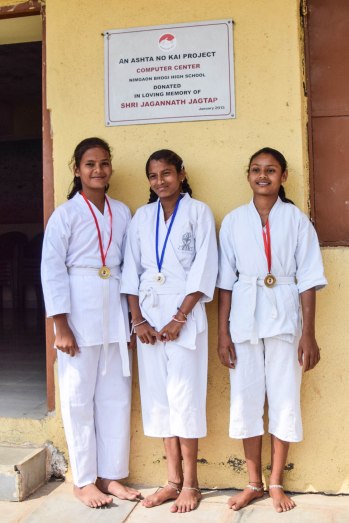
on the girls. I cannot claim full responsibility. Deborah Clearwater has been coming religiously to our weekly lessons for about 8 months now can take great responsilibity. We are of course but a conduit for helping Ashta No Kai transmit this female empowerment message. There are several such conduits including health and legal education and karate classes.A new lady, Erin, came to the village with us this week. Deborah and I beamed with pride when one of the girls went straight up to her and asked her name, how she was and finally said, ‘nice to meet you’. We beamed with pride when we asked the girls to work in pairs and they did with no hesitation. We beamed with pride when we asked them to use their initiative to apply that day’s learning to new ideas of their own choosing and they did! We beamed with pride because these are skills unimaginable a mere 18 months ago. We turned to each other and said, ‘this is why we do it. This is affirmation that we are making an impact.’

Has the girls English improved in this time? Somewhat – dramatically – definitely not! Why not? The boundaries to learning were so strong that a simple task that should take 10 minutes takes 120 minutes. Progress to me is irrelevant. The girls when older can choose to learn English but if they fall into the trap of blindly accepting everything they are told; if they are not trained to puzzle out answers; if they are not encouraged to see just how incredible they are, that they should believe in themselves then no matter how good their English is, their future is limited to whatever other people say their future should be.
This is not why I came to India but it is what I will take away and something incredible to have been involved in!
I am also so very proud to say that I have been able to lead others towards supporting Ashta No Kai this month. From a former neighbour who donated ₹1000 ($20) to a friend who gave me a cheque for ₹5000 ($100). A friend’s company has just donated ₹2.5 lakh ($5,000). A fantastic woman here on a British Council internship is in the process of taking over the running of the charity’s website (soon to be launched). Another lady, with a background in development work analysis and grant applications has offered to work with Ashta No Kai to produce professional impact assessements while also helping to apply for much needed grants. I now also co-ordinate a group of expat women happy to come regularly or some as and when needed to the village to support the more regular teachers. Hence ensuring that if I cannot attend lessons one week, lessons can continue without me therefore causing less disruption to the girls’ lessons.
Myself and Deborah have also found success recently more locally, indeed in the oldest part of Pune – Kasba Peth. For about 9 months, I have been teaching a young man English.
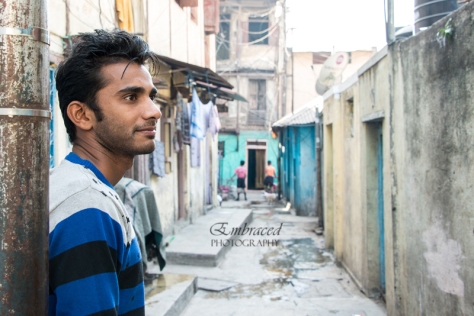
He is in his early 20s and is developing a carreer in finance. Walking through his community one day on an incredible tour (Chalo Heritage and Nature Walks), I came across this shy unassuming guy – terrifyed to speak English but desperate to learn! 7 months later, I realised from weekly excursions into this tightly knit community that the women (one in particular) seemed anxious to learn English but household duties and to a certain extent mother-in-law reluctance meant that any attempt to offer them free lessons was going to fall on deaf ears (if disappointed ones!).
The offer to teach their pre-school children English (Deborah and Barb’s job) thereby freeing the women up for that hour to learn English (my job) turned the whole situation around. The child’s education being only possible if the women also came to class. Mother-in-laws therefore agreed as the opportunity for their grandchildren to spend time with expats learning English was too good an opportunity to miss.
Four lessons in, it is still an evolving group. There is a central core of 2 – 3 women but every lesson has brought new students. The women are incredibly excited about learning and spend their lessons giggling, with me telling them off for helping the others rather than letting them learn for themselves.
Most of these women finished their education between the ages of 12 – 15 and therefore not only is learning a skill they have to recall but I’m doing it in a very different way to how they were used to it! My achievement that I am proud of this month therefore is being able to set this group up (believe me not an easy feat!) and now that the woman I set it all up for finally came to lessons on Friday!! I could have burst with happiness!
For cultural reasons, I cannot show you the children’s lessons in progress. Some of the girls are Muslim and consequently their parents do not want their photos published. Love the old man blowing up his balloon (not his granddaughter’s – no – HIS balloon!) Barb, clearly enjoying the incredible time she has with the children every week.
While I teach the mixed community women (Hindu and Muslim) in the local Hindu temple, Deborah and Barb teach their children on the pavement outside. There are three particular children who always attend with a floating collection of other children and adults on a weekly basis. My moment of pride in the kids came on Friday when one rounded the corner and upon seeing me said confidently, ‘Good morning!’ – loud and clear! This little girl is not quite 4 (she is a twin). Her little sister (about 2 1/2 years old) is beginning to get the confidence to sit close to Barb and Deborah and is beginning to talk to them (in Marathi) where before she hid or stayed very close to her older sisters. They are the children of the mum I set the classes up for.
Her attendance on Friday in my lessons was a vote of confidence in Deborah and Barb. Previously, she had washed clothes or dishes outside her house while keeping a wary eye on her children, now she is happy to leave them and learn herself. This woman therefore who spends most of her life under the wary eye of her mother-in-law now has an hour a week where she is a woman: not a mother, a sister, a wife, a daughter-in-law – simply a woman. I like to think that that hour of giggles and laughter is something the women look forward to and is perhaps not the highlight of their week but certainly a high point.
It has been challenging however as we have an increasing number of women desperate to have lessons but I am just one person and a class of 20 is simply not going to work. We have a new volunteer however – Erin (who also comes to the village) – although she has taught English in the past, she is conscious that she needs to develop the necessary skills to teach in India. Once she is confident however we intend to either increase the size of our current women’s class or to start a second one! Amazing!
That all sounds like I am looking for a big pat on my back, ‘well done, Karen – aren’t you doing well.’ It is not intended that way. People talk about being just a drop in the ocean as something negative – as if you are making no impact. What is the ocean made of however? Simple – millions of drops. Create enough drops and you have an ocean.
If you can support Ashta No Kai in any way, please feel free to contact me (whatwillhappentome@gmail.com). Ashta No Kai will happily accept financial as well as practical support.

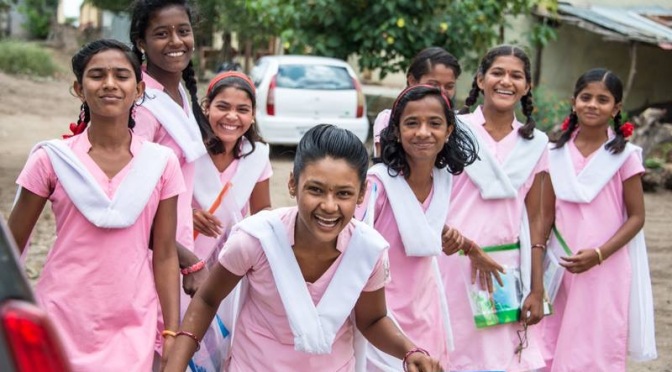




 Reality is that we are far from ‘The Hogans’ that once existed when the last of the modern core Hogan family was born in 1948 (my mother as it happens). We are the Hogan clan yet so many of us are a generation if not even two generations away from the original Hogan title. Some of us may not even share the blood of the Hogans but through upbringing and shared experiences are as very much a Hogan as anybody else. For we are Ironsides, Lydons, McDonalds, McCarthneys, O’Sheas, Donaldsons, Farrellys, Healys, Gallaghers, Scanlons, Bantins, Mathers, Buckleys, Warrens, Carrolls and probably many more that I cannot keep track of. What unites us all though is the strength of identity and indeed the strength of personality of twelve brothers and sisters. For us first cousins, these aunts and uncles; mothers or fathers are the originals – the very heart and soul of the Hogan clan.
Reality is that we are far from ‘The Hogans’ that once existed when the last of the modern core Hogan family was born in 1948 (my mother as it happens). We are the Hogan clan yet so many of us are a generation if not even two generations away from the original Hogan title. Some of us may not even share the blood of the Hogans but through upbringing and shared experiences are as very much a Hogan as anybody else. For we are Ironsides, Lydons, McDonalds, McCarthneys, O’Sheas, Donaldsons, Farrellys, Healys, Gallaghers, Scanlons, Bantins, Mathers, Buckleys, Warrens, Carrolls and probably many more that I cannot keep track of. What unites us all though is the strength of identity and indeed the strength of personality of twelve brothers and sisters. For us first cousins, these aunts and uncles; mothers or fathers are the originals – the very heart and soul of the Hogan clan.



















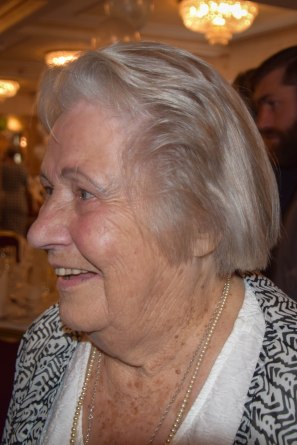
































































 Would I go to the soaring mountain tops of the Himalayas and glide through mountain passes (shivering perhaps just a little now that the summer evenings are easing away and becoming increasingly cold)? Or would I gently glide towards the sea and spend my days wafting along the thermals and resting every now and again on the golden beaches of Goa?
Would I go to the soaring mountain tops of the Himalayas and glide through mountain passes (shivering perhaps just a little now that the summer evenings are easing away and becoming increasingly cold)? Or would I gently glide towards the sea and spend my days wafting along the thermals and resting every now and again on the golden beaches of Goa?

 I have a tendency to forget that I am perhaps slightly unusual in that I will do anything and go anywhere and very little shocks me. I tend to take new things, new ideas, new places more or less in my stride and rarely do I find myself over-whelmed by the unknown. Several times now however I have taken new people to Shivaji Market: the main fruit, vegetable, meat and fish market in the centre of the city in a area called Camp. It is a fascinating place. The sights, smells and textures (you will get it when you walk there – yes, textures under your feet) are exhilarating most of the time although sometimes slightly stomach churning! So it was to Shivaji Market that we took the ‘new’ Anette.
I have a tendency to forget that I am perhaps slightly unusual in that I will do anything and go anywhere and very little shocks me. I tend to take new things, new ideas, new places more or less in my stride and rarely do I find myself over-whelmed by the unknown. Several times now however I have taken new people to Shivaji Market: the main fruit, vegetable, meat and fish market in the centre of the city in a area called Camp. It is a fascinating place. The sights, smells and textures (you will get it when you walk there – yes, textures under your feet) are exhilarating most of the time although sometimes slightly stomach churning! So it was to Shivaji Market that we took the ‘new’ Anette.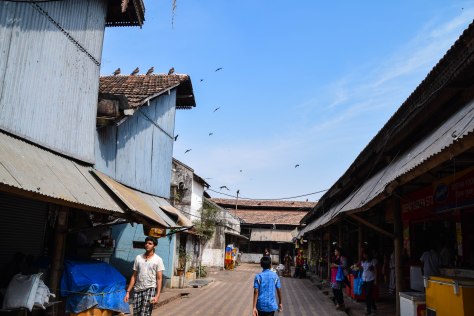
 A normally chatty woman, initially she was rather silent as she took in all that was to be seen. Silence however broken by laughter as my usual fruit seller upon seeing me and my camera, jumped to his feet, gathered his mates around and demanded a very posed picture with his mangoes. The spontaneous enthusiasm of these guys very much reflects the nature of this market. Yes, serious business is done but that doesn’t mean there isn’t time for a giggle!
A normally chatty woman, initially she was rather silent as she took in all that was to be seen. Silence however broken by laughter as my usual fruit seller upon seeing me and my camera, jumped to his feet, gathered his mates around and demanded a very posed picture with his mangoes. The spontaneous enthusiasm of these guys very much reflects the nature of this market. Yes, serious business is done but that doesn’t mean there isn’t time for a giggle!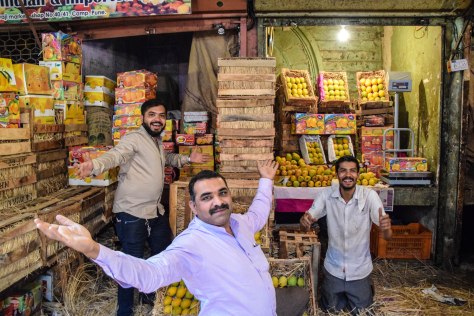





 Outside the fish hall for me is the most fascinating place. It is the ice stall! It just sells huge blocks of ice. Stall holder or just browsing customer goes and orders a certain weight of ice. The ice is then crushed put into a box or a bag and money is handed over. The ice stall seems a long, long way from the modern world. Indeed, it is not completely uncommon to see hand carts of blocks of ice being pushed through the city streets with various vendors stopping them to purchase off them. Another reason, indeed if you even needed one, not to eat ice or ice based drinks!
Outside the fish hall for me is the most fascinating place. It is the ice stall! It just sells huge blocks of ice. Stall holder or just browsing customer goes and orders a certain weight of ice. The ice is then crushed put into a box or a bag and money is handed over. The ice stall seems a long, long way from the modern world. Indeed, it is not completely uncommon to see hand carts of blocks of ice being pushed through the city streets with various vendors stopping them to purchase off them. Another reason, indeed if you even needed one, not to eat ice or ice based drinks!




 My favourite vision of the day however was ‘old’ Anette picking up a trumpet and giving it a go in a metal shop. The shopkeeper seemed a little bemused by the fact that she knew what she was doing (she plays various brass instruments) – again women here don’t necessarily play such instruments – saying that in the west they are not always considered appropriate for women either! In true Indian style however he found an opportunity to have a laugh, picked up another trumpet and joined right in with her! Apparently, it was in the wrong key however and she walked away empty handed.
My favourite vision of the day however was ‘old’ Anette picking up a trumpet and giving it a go in a metal shop. The shopkeeper seemed a little bemused by the fact that she knew what she was doing (she plays various brass instruments) – again women here don’t necessarily play such instruments – saying that in the west they are not always considered appropriate for women either! In true Indian style however he found an opportunity to have a laugh, picked up another trumpet and joined right in with her! Apparently, it was in the wrong key however and she walked away empty handed. Our wander then took us up the busy and in my mind less enjoyable MG Road – here western shops compete with tiny independent ones but it seems more touristy; less local. It may also have been that by then I was hot, tired and just a little hungry – never eat on the morning before you go to Ram Krishna’s! You can’t, otherwise how will you manage to eat all the yummy food you have ordered? Especially, of course, the masala paper dosa – a must have!
Our wander then took us up the busy and in my mind less enjoyable MG Road – here western shops compete with tiny independent ones but it seems more touristy; less local. It may also have been that by then I was hot, tired and just a little hungry – never eat on the morning before you go to Ram Krishna’s! You can’t, otherwise how will you manage to eat all the yummy food you have ordered? Especially, of course, the masala paper dosa – a must have!
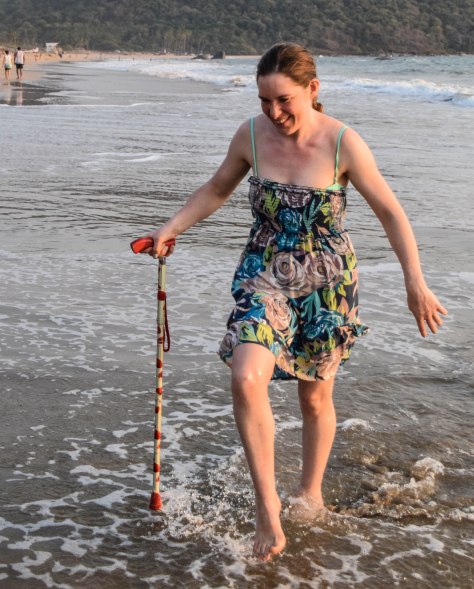
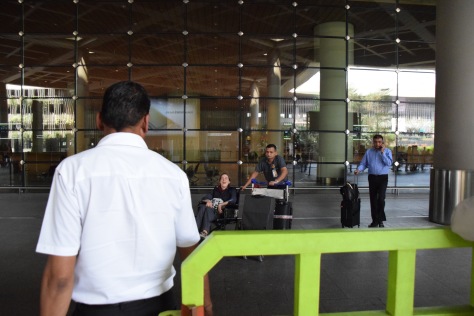

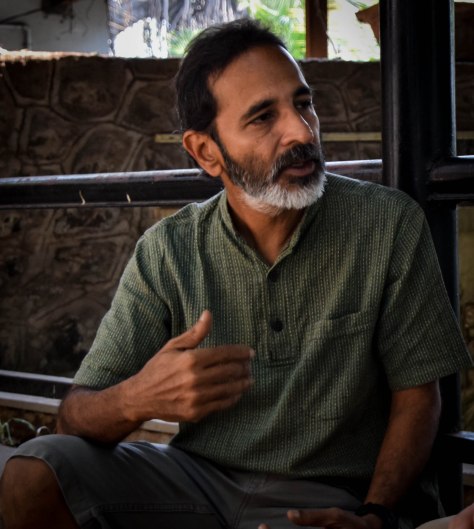


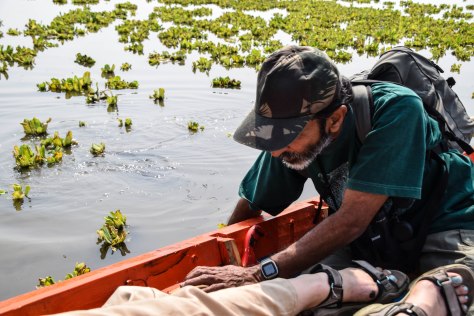
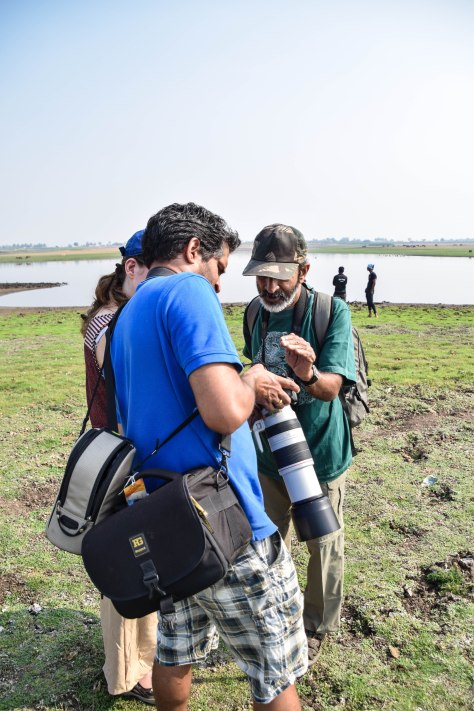
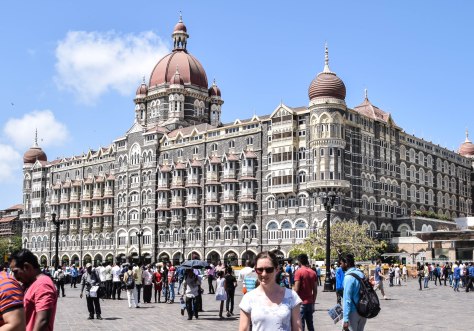







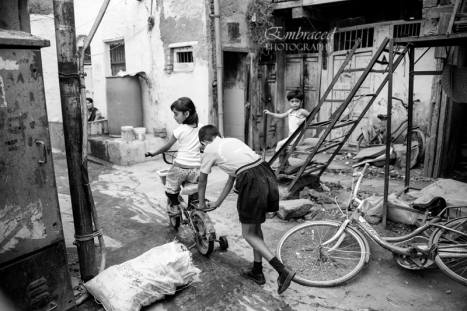

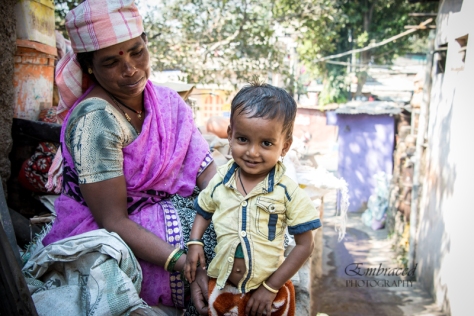












 If I had used my walking stick for the entire duration of our outing, would I have overdone it so much? Would it have enabled me to use less energy by providing me with support, balance and indeed a method of propulsion. Perhaps, but I was too scared and embarrassed to try it.
If I had used my walking stick for the entire duration of our outing, would I have overdone it so much? Would it have enabled me to use less energy by providing me with support, balance and indeed a method of propulsion. Perhaps, but I was too scared and embarrassed to try it. I am still a walking stick virgin however. I still hold it wrong at times and have to adjust it. I dropped it crossing the road until I remember to twist its string around my wrist so it wouldn’t fall. At times I don’t quite get the propulsion right and it lands on the ground at an odd angle. I haven’t learnt how to balance it when I sit down. I also haven’t learnt how to accept that it might be useful to me.
I am still a walking stick virgin however. I still hold it wrong at times and have to adjust it. I dropped it crossing the road until I remember to twist its string around my wrist so it wouldn’t fall. At times I don’t quite get the propulsion right and it lands on the ground at an odd angle. I haven’t learnt how to balance it when I sit down. I also haven’t learnt how to accept that it might be useful to me.
